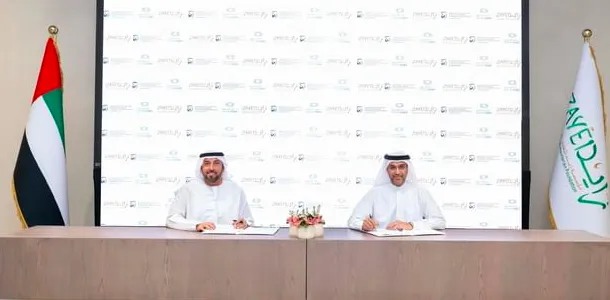Zayed Charitable & Humanitarian Foundation has signed an agreement with Noor Dubai Foundation to support the screening and management of diabetic eye disease among patients in Morocco, reinforcing efforts to prevent blindness globally.
This collaboration aims to establish a well-structured screening programme for the early detection of diabetic retinopathy by enhancing existing infrastructure with Artificial Intelligence (AI) technology, particularly in remote areas.
The programme, which will run for six years, will not only leverage advanced AI technology but also develop AI-enabled diabetic retinopathy guidelines, create patient referral pathways, and invest in human capital by training physicians and healthcare providers.
The signing ceremony was attended by Dr Mohamed Ateeq Al Falahi, Director General of Zayed Charitable & Humanitarian Foundation, and Awadh Seghayer Al Ketbi, Chairman of Noor Dubai Foundation and Director General of Dubai Health Authority, along with Dr Manal Omran Taryam, CEO of the Noor Dubai Foundation, and several executives and professionals active in humanitarian work.
In a statement, Dr Mohamed Al Falahi emphasised the importance of partnerships with specialised foundations to deliver advanced services through cutting-edge technologies such as AI.
He noted that this collaboration aligns with the “Zayed Humanitarian Legacy” initiative, launched in March 2024, which aims to support development in healthcare, technology, and other fields, ensuring sustainable wellbeing for communities. “The introduction of advanced technologies like AI is an innovative solution to the challenges governments face in providing accessible, high-quality healthcare,” Al Falahi said, praising Noor Dubai’s approach to solving service delivery issues with cost-effective, sustainable solutions.
Awadh Al Ketbi also stressed the importance of partnerships and combined efforts in delivering impactful, sustainable programmes to communities both in the UAE and abroad. He praised the humanitarian work of the Zayed Charitable & Humanitarian Foundation, which provides essential services locally and internationally.
“At Noor Dubai, we are pleased to partner with Zayed Charitable & Humanitarian Foundation. This partnership will deliver crucial services to the people of Morocco and support several Sustainable Development Goals (SDGs), including SDG 17 on partnerships. We look forward to working with our Moroccan colleagues to develop a sustainable programme and reduce the impact of diabetes, a prevalent chronic disease affecting vision and wellbeing,” he added.
Dr Manal Taryam highlighted the challenges of combating blindness and visual disabilities caused by non-communicable diseases. “Following Noor Dubai’s success in advancing SDGs by preventing blindness, it was essential to take the next step by introducing technologies such as tele-ophthalmology and AI. International data shows that 387 million people globally live with diabetes mellitus, a figure expected to rise to 592 million by 2035. In 2023, the American Academy of Ophthalmology estimated that 27.0% of diabetic patients suffer from diabetic retinopathy, a statistic that cannot be ignored,” Taryam said.
As part of Noor Dubai’s strategy to combat avoidable blindness globally, the foundation is committed to innovating for a brighter future for all.
Taryam concluded by reaffirming Noor Dubai’s commitment: “We are dedicated to fighting preventable blindness by harnessing innovation and technology to deliver solutions that transform lives. By integrating AI and tele-ophthalmology into our efforts, we are taking decisive steps towards a future where quality eye care is accessible to all, regardless of geographical or economic barriers.”

